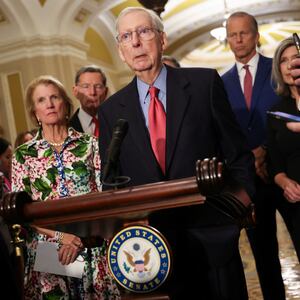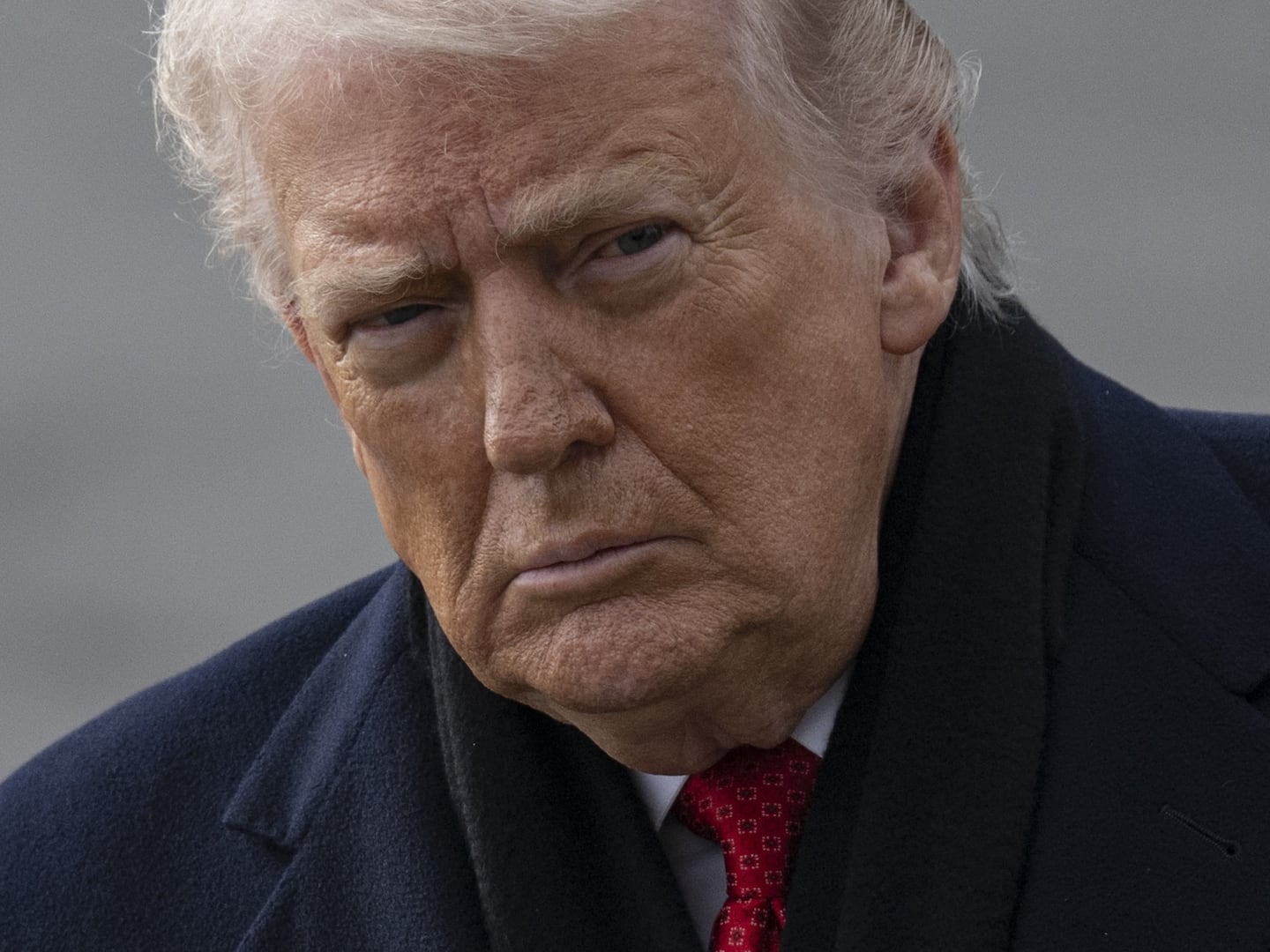For decades, Democrats have hated, cursed, and battled Sen. Mitch McConnell, a man they viewed as one of the great villains of modern political history.
But with McConnell’s faltering health putting his future as leader of the Senate GOP in doubt, Democrats are contemplating something strange: the idea of missing him.
It’s not that they have forgiven or forgotten the longtime GOP leader’s aggressive, norm-busting maneuvers to implement a conservative majority on the Supreme Court, or his numerous Senate machinations to stymie Democratic policies over the years.
But in recent years, Democrats have come to see McConnell as a bulwark against the party’s MAGA lurch, pointing to his opposition to Donald Trump’s leadership of the party, his support for robust U.S. aid to Ukraine, and his productive working relationship with President Joe Biden.
Even though McConnell’s likeliest successors are more like him than not, the prospect of new leadership—which may be less effective or inclined to rein in the hard right or to work with Democrats—is reportedly prompting anxiety and apprehension in Biden’s White House, according to Politico.
In the Senate, of the Democratic members The Daily Beast surveyed on Wednesday, most were cautious about McConnell’s potential departure. But none expressed eagerness to see him go.
“McConnell is an institutionalist,” said Sen. Peter Welch (D-VT). “I’ve come to respect him for standing up for the institution.”
While Welch said he was “not apprehensive” over McConnell’s potential exit, he acknowledged whoever comes next will represent a real change for the institution. “I will say, McConnell is experienced, confident, and in control,” he added.
Meanwhile, Sen. Tim Kaine (D-VA)—who said he has “massively” disagreed with McConnell while working with him productively on some policy issues—outlined one of the reasons that Democrats might miss his reign. “When he says something is going to happen on his side, it’s usually right,” Kaine said. “And that does give you some sense of predictability, even if you’re not thrilled about the outcome all the time. Sometimes it’s nice to have a pretty good sense about what will happen, and that is a hallmark of his leadership on the Republican side.”
Some old McConnell foes outside the Senate aren’t exactly popping the champagne, either.
Jim Manley, a former top aide to the late Senate Democratic leader Harry Reid—McConnell’s nemesis for years—argued the Kentucky Republican had “done an enormous amount of damage to the Senate, the likes of which can never be repaired.”
Still, Manley acknowledged reasons why Democrats might be reluctant to see McConnell go. “I mean, we’re in a weird situation here, where you might prefer the devil you know instead of the devil you don’t,” he said.
“I long ago gave up getting mad over the fact that the president keeps on saying nice things about Sen. McConnell,” Manley added. “But you know, at least he has developed a relationship with him over the years, for better or for worse, that has allowed him to get things done.”

Just as notable as some grudging respect for McConnell was the reluctance of his biggest critics to engage with the question of his succession or comment on his legacy.
Sen. Sheldon Whitehouse (D-RI), probably the senator who has most vehemently protested and scrutinized McConnell’s impact on the federal judiciary, told The Daily Beast he had not even considered a Senate without McConnell.
Pressed on whether that could really be the case, Whitehouse said he just hadn’t “given it any thought, I’m sorry to say.”
A similar exchange played out with Sen. Elizabeth Warren (D-MA), who famously reappropriated a slight from McConnell as a Trump-era feminist rallying cry. She declined to comment on the GOP leader.
Given McConnell’s condition, it may not be surprising that even his most devoted critics are staying circumspect. After a fall in March led to a concussion—and after suffering two other falls—the Kentucky Republican has looked noticeably frail. His two very public freeze-ups at press conferences this summer have sparked genuine concern about his health and ability to lead the conference.
At a press conference on Wednesday, McConnell insisted to reporters he has a clean bill of health, citing a letter from his doctor, and stated his intent to serve the rest of his term, which ends in 2026.
But it’s hard to believe that any player or close observer of the Senate is not thinking about the Senate GOP succession question, which has lingered in the background of Capitol Hill for years. A McConnell spokesman did not return a request for comment.
First elected in 1984, the 81-year-old McConnell is the longest-serving Senate GOP leader in history. Many incumbent senators have never served under another leader. He has run his conference with a level of control that rivals the GOP’s own villain, former Speaker Nancy Pelosi, and fended off challenges to his role—though he faced his most serious threat yet last year, from Trump-aligned Sen. Rick Scott (R-FL).
Whenever McConnell does step aside, the conventional wisdom holds that it will not be a right-wing rank-and-filer who succeeds him but a member of his leadership team: either Sen. John Thune (R-SD), Sen. John Cornyn (R-TX), or Sen. John Barrasso (R-WY).
Thune, currently the minority whip, is nearly as cold on Trump and Trumpism as McConnell, and he has fended off challenges in deep red South Dakota despite the MAGA wing’s vows to take him out. Cornyn, himself a former whip, can be more of a partisan, but boasts strong working relationships with Democrats.
Barrasso is seen as the most Trump-aligned of the three, and has more frequently defended the former president. In his role crafting messaging as conference chair, he has led harsh attacks on Biden and Democrats.
Notably, however, Trump has criticized the three potential successors, comparing them to “RINOs” and branding them as acolytes of his foe McConnell.
Some Democrats believe the McConnell era might continue in the form of whichever of the trio ultimately wins the top job.
“I think the leading candidates to replace him, if that should ever happen, are very much aligned with him in their political and personal leanings,” Sen. Richard Blumenthal (D-CT) told The Daily Beast.
To some observers, the critical difference between these senators and McConnell—the one with the greatest implications for how the Senate GOP operates—is less in political leanings and more in personal and strategic style.
The Kentucky Republican is famous for saying little in public, while working to outmaneuver his foes behind the scenes. His approach was evident in the face of Trump’s outright hatred toward him as well as the leadership challenge from Scott.
“McConnell had an ability to suffer slings and insults in silence, and he enacted most of his vengeance very quietly,” said Jim Kessler, vice president at the center-left think tank Third Way.
“His ability to not care what the national media says about him was helpful when he stood up against Trump,” Kessler continued. “I don’t know if the people who succeed him will feel the same way.”
Democrats and Republicans, of course, acknowledge the rich irony in even entertaining the question of whether McConnell might be missed at all by his longtime foes, who have held him up as exhibit A of GOP ruthlessness.
Any Democratic discussion of his legacy may begin and end with his refusal to grant consideration to Barack Obama’s nominee to replace the late Justice Antonin Scalia on the Supreme Court in 2016, leaving the seat open for over a year until Trump could fill the seat with another conservative.
“What they won’t miss is just how shrewd he is,” said Sen. Kevin Cramer (R-ND) of Democrats. “That’s a pretty remarkable gift and skill, particularly in legislative leadership, that gets some things done, but it also leaves them scratching their heads, on ‘how did we get done in like that?’”
Third Way’s Kessler, who was once a top aide to Senate Majority Leader Chuck Schumer (D-NY), acknowledged McConnell was an “incredibly worthy adversary” while still expressing his hope he remains the GOP leader.
“He has stood up against the worst elements of the Republican Party,” Kessler said, “and that’s important.”








